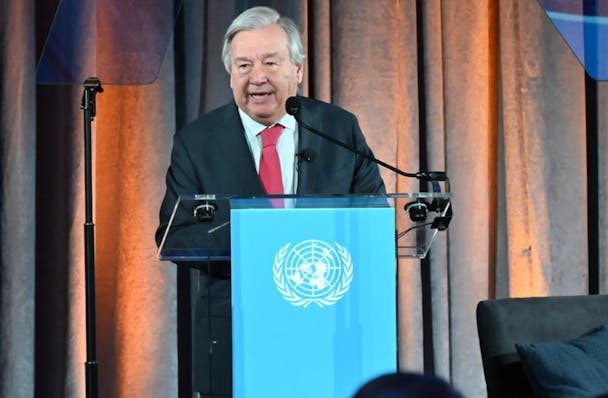UN call for fossil fuels divestment sparks discourse: ‘Outlawing oil ads is inevitable’
Advertising leaders confront the industry’s complicity, challenge greenwashing in ads and demand change in response to comments from UN Secretary-General António Guterres about advertisers’ role in the climate crisis.

António Guterres delivering his climate action address on Wednesday / Credit: United Nations
Advertising industry experts are responding to the special climate action address that UN Secretary-General António Guterres delivered in New York City in honor of World Environment Day on Wednesday.
Explore frequently asked questions
In his address, Secretary Guterres criticized advertising and PR titans – including Dentsu, Edelman, Havas, Interpublic Group, Omnicom, Publicis and WPP – calling them “enablers to planetary destruction” for protecting the fossil fuel industry’s image.
He accused the holding companies of greenwashing, spreading disinformation and ”knowingly work[ing] against scientific consensus.” The Secretary also called for a global ban on fossil fuel ads and urged news media and tech companies to stop accepting such advertisements.
This speech follows an Earth Day pledge launched by Clean Creatives, an anti-fossil fuel campaign group in the advertising and PR industry, which has garnered commitments from over 1,000 agencies to stop advertising for Big Oil.
Duncan Meisel, executive director of Clean Creatives, responded to the address, telling The Drum: “We will look back at this speech as a turning point in the ad and PR industry’s collaboration with fossil fuel polluters. The agencies and brands that heed this call to action will be seen as leaders, and the ones that resist will be seen as part of a long history of delaying essential climate action at the cost of precious time and lives.”
A moment of accountability
Other advertising and media leaders agree with Guterres’s categorization of the industry’s role in perpetuating a harmful narrative about climate change.
According to Rachael Kay Albers, founder of creative studio RKA INK, the advertising industry bears much of the blame for the current climate crisis due to the promotion of mass consumption of fossil fuel-dependent goods over the last 150 years. “Advertising has helped normalize and romanticize the consumer lifestyle that demands increasing amounts of fossil fuels to sustain itself,” she says.
And the brands selling mythically climate-friendly or ’sustainable’ solutions are the ones directly responsible for it, says Albers. As she puts it: “Greenwashing is a dangerous distraction and deflection that forces us to constantly entertain the ridiculous concept that the companies who got us into this mess will be the ones to clean it up. They can’t. They won’t. Our survival and theirs are fundamentally at odds.”
But organizations can also cause damage by being too conservative in their messaging. Blair Huddy, founder and CEO of climate-friendly marketing agency Hudson Davis Communications, cautions against not only greenwashing but what she calls ’green-hushing,’ or corporations’ reticence to disclose sustainability or emissions reduction goals for fear of being labeled greenwashers. This is important, she argues, because “talking about climate and sustainability efforts is how we learn about new technologies and ways of being, so hushing those efforts can have negative effects as well.”
Huddy has worked with the UN since 2017.
Advertisement
According to Katie Harrison, partner and founder at social impact-focused agency WRTHY, goes so far as to label the climate crisis itself “a communications crisis,” as major fossil fuels brands drive the key narrative that their work is worth supporting, “spending billions and reaching billions with climate disinformation.”
With a shred of optimism, Harrison adds that these industries “have been complicit for too long, but also have the skills and the power to change course towards solutions.”
Could adland take a cue from Big Tobacco?
To illustrate that a fossil fuel advertising ban is possible, Secretary Guterres highlighted in his remarks that tobacco advertising is already banned in many parts of the world.
Advertisement
It’s an example that resonates with some ad industry insiders.
“The banning of tobacco advertising demonstrates a similar outlawing of fossil fuel ads is not just feasible; it’s inevitable,” says Caroline Davison, managing director and sustainability lead at B Corp certified creative agency Elvis. “The question agencies must ask themselves is whether they are going to expedite the process, say no to fossil fuel clients and be on the right side of history, or continue to claim the tiny percentage of [capital expenditures] being invested in renewable technologies by their fossil fuel clients is justification for business as usual.”
Davison cites a recent report from the Institute of Practitioners in Advertising that finds that 49% of ad agency respondents felt their agency was doing too little to address climate change, with 70% of industry insiders agreeing the industry was falling short.
“Wouldn’t it be wonderful if we also used the UN Secretary General’s comments as a collective impetus to change?” she adds. “What if the ad industry acknowledged the role it has to play in bringing about change for the good of society and called for a ban on fossil fuel advertising ourselves? What if we took responsibility, took control and rolled it out in such a way that it was a positive transition for all concerned?”
The implications of a potential ban on fossil fuel ads
A potential ban on advertising fossil fuel brands could have significant implications for consumers, advertisers and brands, of course.
For one, it could reduce misinformation from marketers, according to Hudson Davis Communications’ Huddy, possibly giving consumers a clearer view of the state of the climate crisis. However, she warns that it won’t eliminate misinformation in other media, noting that “large amounts of misinformation these days come from everyday people on social media [as well as] politicians and other figures at the helm.”
Fossil fuel brands would, of course, likely see a negative impact on revenues from lost advertising and marketing efforts. Ad and PR agencies, too, would see the impact on their bottom lines.
Of course, for adland, divesting from fossil fuels entirely may be nearly impossible, considering the ubiquity of fossil fuel in consumer products. “We need to remember that fossil fuels and its derivatives are used in more than just gas,“ says Huddy. “They’re behind nearly all of the products we use.”
For more, sign up for The Drum’s daily newsletter.

